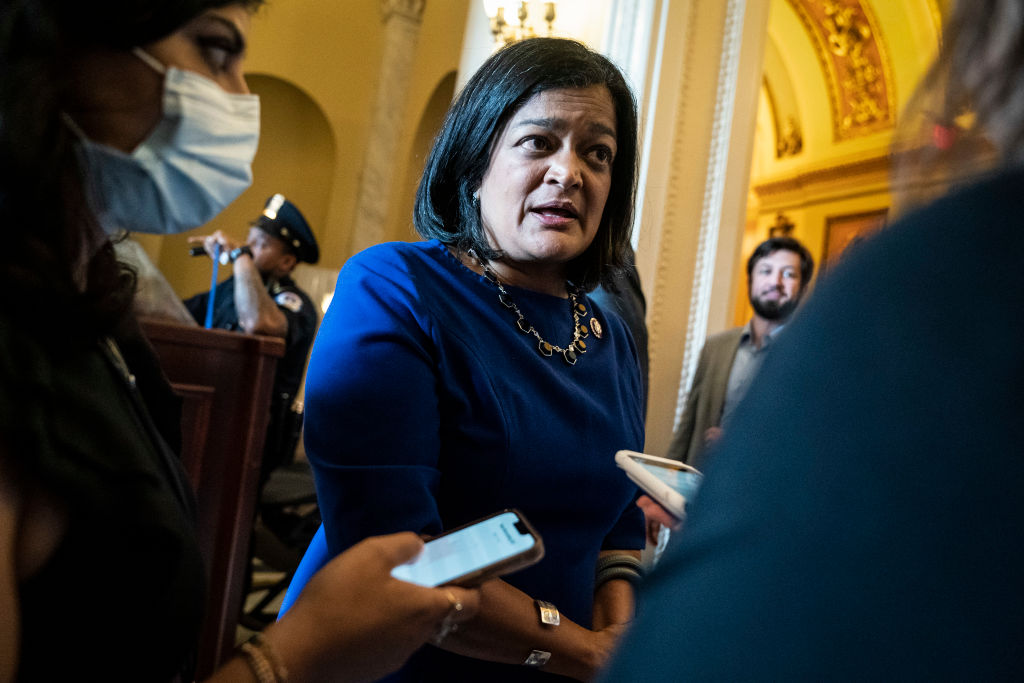UPDATE: Congressional Progressive Caucus chair Pramila Jayapal announced Tuesday afternoon that members were retracting their letter calling for the Biden administration to negotiate for a ceasefire in Ukraine. The group faced backlash from Democratic lawmakers and criticism from members who signed the letter over the summer but did not agree with the timing of its release. In a statement, Jayapal lamented the letter’s conflation with recent Republican statements questioning future aid to Ukraine, saying it had created a distraction. Still, she appeared to stand behind the substance of the letter.
The upcoming Congress may bring new scrutiny to America’s response to Russia’s war in Ukraine, regardless of which party picks up more seats in November.
Last week, House GOP Leader Kevin McCarthy predicted new Ukraine aid will be more difficult to pass in a Republican House than the current Democratic Congress. This week, 30 Democrats are pressing the White House to seek a negotiated end to the war, including through direct diplomacy with Russia.
Since Russia launched its invasion earlier this year, lawmakers have overwhelmingly backed the Biden administration’s supportive stance toward Ukraine, sending weapons and other aid to the Ukrainian military and passing sweeping sanctions to punish Russia. But members of both parties are now more urgently looking for an off-ramp to the brutal conflict that has caused thousands of deaths, displaced millions of people, and strained global energy supplies.
Those calling for a shift in America’s approach have different politics: Some vocal, Trump-aligned Republican isolationists have for months criticized sending any money to Ukraine, while progressive Democrats remain supportive of military assistance for now. But both factions say they are concerned about the prospect of nuclear escalation by Russia in the wake of Ukraine’s recent military gains.
The 30 Democrats, led by Congressional Progressive Caucus Chair Rep. Pramila Jayapal, published a letter Monday urging President Joe Biden to pair the military and economic support America has sent to Ukraine with “a proactive diplomatic push” for a ceasefire, fearing a “catastrophic escalation.”
“We agree with the administration’s perspective that it is not America’s place to pressure Ukraine’s government regarding sovereign decisions,” they wrote, but “as legislators responsible for the expenditure of tens of billions of U.S. taxpayer dollars in military assistance in the conflict, we believe such involvement in this war also creates a responsibility for the United States to seriously explore all possible avenues, including direct engagement with Russia, to reduce harm and support Ukraine in achieving a peaceful settlement.”
Congress, which is likely to consider more Ukraine aid after the midterm elections, has overwhelmingly approved past assistance packages, and shutting off the spigot of support entirely would require a major shift in both parties. But the letter indicates the White House shouldn’t take sweeping congressional support for military aid packages for granted.
Some Democrats pushed back on the letter Monday afternoon.
Rep. Jake Auchincloss of Massachusetts called it “an olive branch to a war criminal who’s losing his war.”
And Sen. Chris Murphy, a Connecticut Democrat and member of the Foreign Relations Committee, wrote that “moral and strategic peril” exists in negotiating with Russian leader Vladimir Putin too early.
“It risks legitimizing his crimes and handing over parts of Ukraine to Russia in an agreement that Putin won’t even honor,” Murphy argued. “Sometimes, a bully must be shown the limits of his power before diplomacy can work.”
Amid backlash, the group of progressives behind the letter released a followup statement that their support for Ukraine is unchanged.
Rep. Mark Pocan, who co-signed the letter, responded to criticism on Twitter by saying it had been written in July, and “I have no idea why it went out now. Bad timing.”
Backlash to the letter among Democrats illustrates how much of the party still backs a strong Ukraine response. And even as GOP leaders in the House haven’t been particularly enthusiastic about new aid packages—with McCarthy raising doubts about it last week and others declining to commit to more money—Republican leaders on key committees and in the Senate are voicing staunch support for staying the course.
Rep. Mike Turner, the top Republican on the intelligence committee who recently returned from a visit to Ukraine, told reporters Monday that one of the goals of the trip was to communicate to Ukrainian President Volodymyr Zelensky “the continued bipartisan support in Washington, and certainly the strong support across the country” for Ukraine.
“Republicans support—and Kevin McCarthy supports—providing weapon systems to Ukraine to continue to win on the battlefield,” Turner said in response to questions about McCarthy’s comments last week.
Senate Minority Leader Mitch McConnell has also said assistance will continue in the next Congress. A Republican Senate majority, he said Friday, “will focus its oversight on ensuring timely delivery of needed weapons and greater allied assistance to Ukraine.”
“It is in America’s core national security interest to make it clear that revisionist states such as Russia or China cannot simply gobble up smaller neighbors,” McConnell said in a release.
And House Speaker Nancy Pelosi said at a press conference in Croatia Monday that she expects assistance to continue.
“Support for Ukraine is bipartisan, it is bicameral,” Pelosi said. “That means in the House and in the Senate. And it starts in the White House with our President.”






Please note that we at The Dispatch hold ourselves, our work, and our commenters to a higher standard than other places on the internet. We welcome comments that foster genuine debate or discussion—including comments critical of us or our work—but responses that include ad hominem attacks on fellow Dispatch members or are intended to stoke fear and anger may be moderated.
With your membership, you only have the ability to comment on The Morning Dispatch articles. Consider upgrading to join the conversation everywhere.